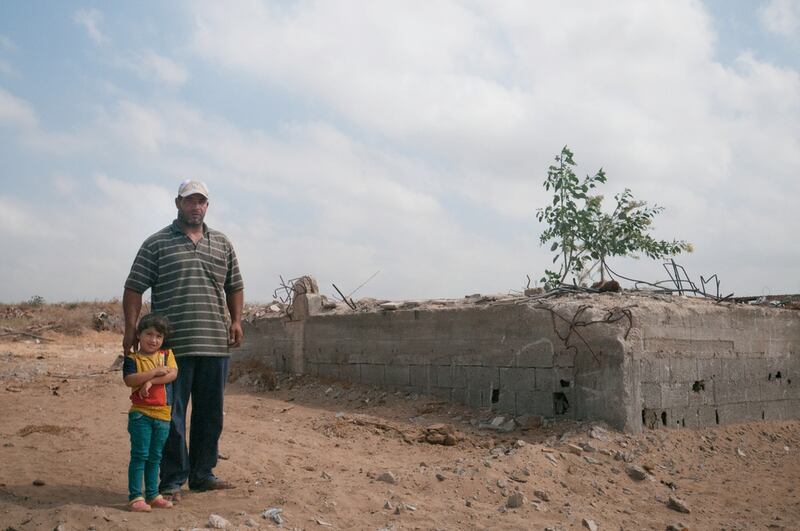Creede Newton
Foreign Correspondent
Johr Al Dik village, Gaza // When Israel first attacked the home of Naser Abu Saad in July 2010, they killed his wife. In April 2011 a bomb delivered by the Israeli Air Force left the building partially destroyed. Then, in the summer of 2014 they completely flattened what was left during a brutal 50-day war on Gaza.
Mr Abu Saad has paid a high price for living so close to the border fence separating this besieged territory from Israel.
Like many Palestinians in Gaza, the 42-year-old farmer is attempting to seek reparations through Israeli courts for the destruction of his home. Their efforts, however are often futile as they become bogged down in a process full of systematic barriers put in place by the Israeli judicial system.
Stood at the gate of what was once his home, surrounded by rubble, Mr Abu Saad described how for more than four year he has been entangled in complicated legal proceedings against the Israeli state for damages to his property.
The father of 8, however remains optimistic. "I have an appointment with an Israeli investigation team," he told The National ahead of the meeting this week.
For the first time since legal proceedings began in July 2010, he has been granted permission to travel to Erez Crossing to meet the Israeli legal team representing him.
The crossing is a pedestrian point of entry for those travelling between Gaza Strip and Israel, and is restricted.
The only Palestinians living in Gaza who are given permits to enter Israel are those working with international organisations, students who plan to leave for overseas studies in Jordan, and patients with special humanitarian needs that require treatment in Israeli-controlled territory.
However, Mr Abu Saad will not be allowed to enter Israel.
As of yet, Israeli courts have neither seen any evidence or called in witnesses related to the case.
According to Mahmoud Abu Rahma, the legal officer at the Gaza-based Al Mezan centre for human rights which is overseeing the case, this is due to the complexities of the Israeli legal system, which aim to make reparations for Palestinians in Gaza impossible.
“In principle, Palestinians from Gaza can go to Israeli courts and seek compensation for damage. In practice, people must overcome many obstacles,” said Mr Abu Rahma.
The Israeli court system requires that authentication of documents, including blood tests, medical examinations, and death certificates, be certified inside Israel. However, Palestinians cannot enter Israel without a permit, and Israelis are completely prohibited from travelling to Gaza.
“In a situation of armed conflict, the occupying power may decide to restrict movement of people, according to the military’s security needs. What we have here is an upside down situation. There’s an absolute ban on movement, with a few exceptions,” Mr Abu Rahma said.
The Israeli supreme court struck down a 2014 joint petition filed by Adalah — the legal centre for Arab minority rights in Israel — that challenged Israel’s policy of preventing Gaza residents from entering Israel to attend their own court hearings.
At the same time, the Israeli attorney general Yehuda Weinstein recommended new procedures “examining requests to enter by Palestinian residents of Gaza for the purpose of pursuing judicial proceedings in Israel”.
Adalah said the recommendations specified that such cases would only be looked into if they did not harm the state’s position in the case.
The attorney general, who also serves as an adviser to the state in Israel’s government, acknowledged that the new procedures constitute a clear conflict of interests. “It’s their [Palestinians] right to seek compensation under both Israeli and international humanitarian law,” said Sawsan Zaher, the Adalah attorney who presented the petition to the supreme court.
“The political implication is blocking Gazans from entering Israel, in order to continue impunity for Israeli soldiers who have committed crimes, and also the Israeli state,” the attorney charged.
Ms Zaher was unaware that Mr Abu Saad would be allowed to enter Erez to meet the representatives, but said that this would not change the fact that many requirements set by the Israeli legal system — including document authorisation by Israeli officials, and the ability to pay exorbitant court guarantees of up US$7,000 (Dh25,710) — are still in place.
“It’s certainly a wall that’s come down” in the Abu Saad case, but there are still more obstacles to overcome, said Mr Abu Rahma, the legal officer of Al Mezan.
One of the barriers is Israel’s Amendment 8, which has retroactive effect dating back to 2005 and allows civil courts to dismiss cases at preliminary stages, as long as harm was caused by Israeli military action.
“Everything [in Gaza] is a military operation,” said Mr Abu Rahma. Even if there is sufficient evidence in the Abu Saad case, it will be very difficult to prove it was negligence on the part of the Israeli military. “Every time our clients break down one wall, we’re afraid to tell them about the next,” Mr Abu Rahma concluded.
Mr Abu Saad hopes that his case will open doors for Palestinians seeking compensation for losses.
“When my case is finished, I hope more Palestinians could seek justice,” he said. “I don’t want reparations for myself, I want them for my children. Once I’m gone, my children will have nothing. They are the ones on my mind, my children and other Palestinians.”
“I’ve been optimistic for the past five years, in spite of everything. I’ll continue being optimistic.”
foreign.desk@thenational.ae





